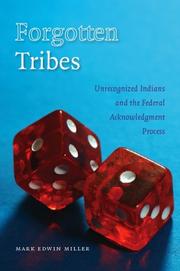| Listing 1 - 3 of 3 |
Sort by
|
Book
ISBN: 0295741597 9780295741598 9780295741574 0295741570 9780295741581 0295741589 Year: 2017 Publisher: Seattle : University of Washington Press,
Abstract | Keywords | Export | Availability | Bookmark
 Loading...
Loading...Choose an application
- Reference Manager
- EndNote
- RefWorks (Direct export to RefWorks)
While the number of federally recognized Native nations in the United States are increasing, the population figures for existing tribal nations are declining. This depopulation is not being perpetrated by the federal government, but by Native governments that are banishing, denying, or disenrolling Native citizens at an unprecedented rate. Since the 1990s, tribal belonging has become more of a privilege than a sacred right. Political and legal dismemberment has become a national phenomenon with nearly eighty Native nations, in at least twenty states, terminating the rights of indigenous citizens. The first comprehensive examination of the origins and significance of tribal disenrollment, "Dismembered" examines this disturbing trend, which often leaves the disenrolled tribal members with no recourse or appeal. At the center of the issue is how Native nations are defined today and who has the fundamental rights to belong. By looking at hundreds of tribal constitutions and talking with both disenrolled members and tribal officials, the authors demonstrate the damage this practice is having across Indian Country and ways to address the problem.
Indians of North America --- Human rights --- Citizenship --- Tribal citizenship. --- Tribal enrollment --- Tribal membership

ISBN: 9786610423668 0803283210 1280423668 0803204094 9780803204096 9781280423666 6610423660 9780803283213 0803232268 9780803232266 Year: 2004 Publisher: Lincoln : Baltimore, Md. : University of Nebraska Press, Project MUSE,
Abstract | Keywords | Export | Availability | Bookmark
 Loading...
Loading...Choose an application
- Reference Manager
- EndNote
- RefWorks (Direct export to RefWorks)
Publisher description: The Federal Acknowledgment Process (FAP) is one of the most important and contentious issues facing Native Americans today. A complicated system of criteria and procedures, the FAP is utilized by federal officials to determine whether a Native community qualifies for federal recognition by the United States government. In Forgotten Tribes, Mark Edwin Miller offers a balanced and detailed look at the origins, procedures, and assumptions governing the FAP. His work examines the FAP through the prism of four previously unrecognized tribal communities and their battles to gain indigenous rights under federal law. Based on a wealth of interviews and original research, Forgotten Tribes features the first in-depth history and overview of the FAP and sheds light on this controversial Native identification policy involving state power over Native peoples and tribal sovereignty.
Indians of North America --- Indian inspectors --- Citizenship --- Government relations. --- Legal status, laws, etc. --- Tribal citizenship. --- Government policy --- Tribal enrollment --- Tribal membership --- Indiens d'Amérique --- Nationalité indienne --- Droit --- Relations avec l'Etat
Book
ISBN: 1496201604 1496201582 9781496201584 9781496201607 9780803225435 0803225431 9781496201591 149623037X Year: 2017 Publisher: [Lincoln, Nebraska] : University of Nebraska,
Abstract | Keywords | Export | Availability | Bookmark
 Loading...
Loading...Choose an application
- Reference Manager
- EndNote
- RefWorks (Direct export to RefWorks)
"A study of the role blood quantum played in the assimilation period between 1887 and 1934 in the United States"-- "Blood Will Tell reveals the underlying centrality of "blood" that shaped official ideas about who was eligible to be defined as Indian by the General Allotment Act in the United States. Katherine Ellinghaus traces the idea of blood quantum and how the concept came to dominate Native identity and national status between 1887 and 1934 and how related exclusionary policies functioned to dispossess Native people of their land. The U.S. government's unspoken assumption at the time was that Natives of mixed descent were undeserving of tribal status and benefits, notwithstanding that Native Americans of mixed descent played crucial roles in the national implementation of allotment policy. Ellinghaus explores on-the-ground case studies of Anishinaabeg, Arapahos, Cherokees, Eastern Cherokees, Cheyennes, Chickasaws, Choctaws, Creeks, Lakotas, Lumbees, Ojibwes, Seminoles, and Virginia tribes. Documented in these cases, the history of blood quantum as a policy reveals assimilation's implications and legacy.The role of blood quantum is integral to understanding how Native Americans came to be one of the most disadvantaged groups in the United States, and it remains a significant part of present-day debates about Indian identity and tribal membership. Blood Will Tell is an important and timely contribution to current political and scholarly debates."--
HISTORY / United States / 20th Century. --- HISTORY / United States / 19th Century. --- SOCIAL SCIENCE / Ethnic Studies / Native American Studies. --- Indians of North America --- Indian allotments --- Allotments, Indian --- Indian non-trust allotments --- Indian trust allotments --- Restricted fee Indian allotments --- American aborigines --- American Indians --- First Nations (North America) --- Indians of the United States --- Indigenous peoples --- Native Americans --- North American Indians --- Citizenship --- Guineas (Mixed bloods, United States) --- Racially mixed people --- Indian inspectors --- Cultural assimilation --- History . --- Government relations. --- Legal status, laws, etc. --- Land tenure. --- Ethnic identity. --- History. --- Mixed descent. --- Tribal citizenship. --- Land tenure --- Culture --- Ethnology --- Tribal enrollment --- Tribal membership --- Mixed bloods --- Race identity --- Land titles --- Real property --- Government policy --- United States. --- Blood quantum --- History
| Listing 1 - 3 of 3 |
Sort by
|

 Search
Search Feedback
Feedback About UniCat
About UniCat  Help
Help News
News